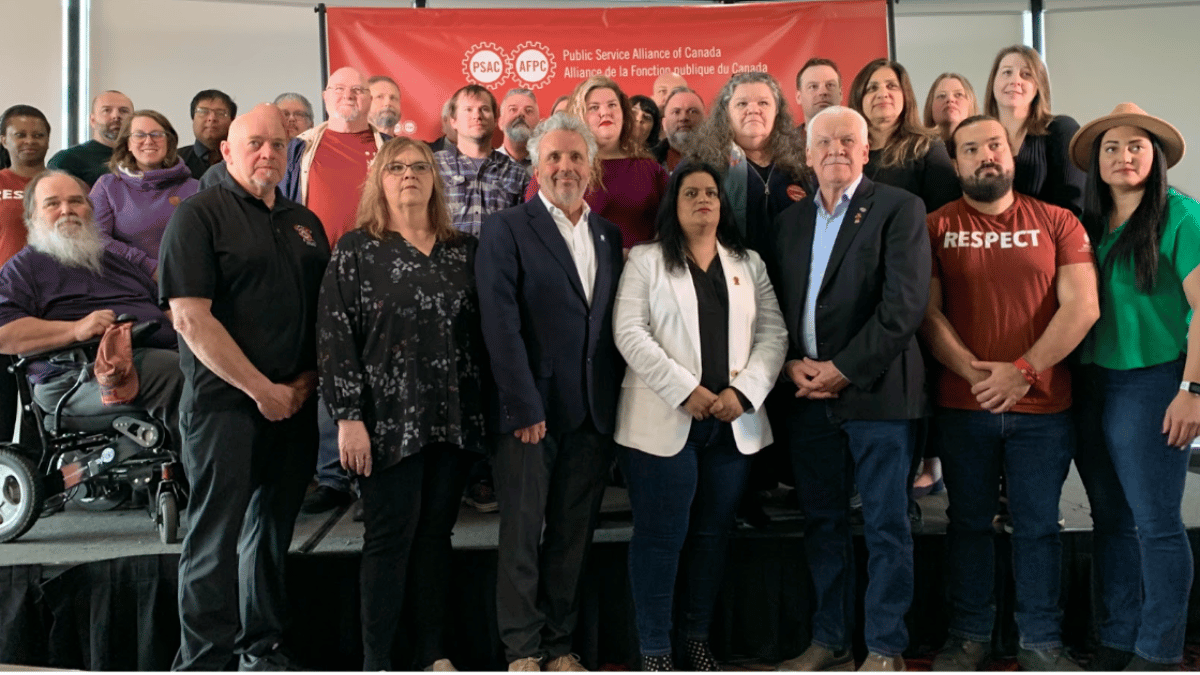The bargaining group of the Public Service Alliance of Canada (PSAC), which represents over 120,000 federal public servants, has voted “overwhelmingly” in support of a strike mandate.
“A strike by PSAC members working for the federal government would be the largest against any single employer in Canada’s history,” the union said in a statement on their website.
The union is now in legal strike position but told reporters at a press conference on Wednesday, April 12 that they will not be taking immediate action. Instead, they intend to finish negotiations sessions that have been scheduled for this week.
PSAC has been holding strike votes since February 22, 2023, after more than a year and a half at the bargaining table. Since talks began in June 2021, wages have been at the forefront of these long and fraught negotiations.
An “insulting” offer of a 1.75 per cent wage increase led PSAC to declare an impasse in talks in 2022. In the winter, both parties spoke with a Public Interest Commission (PIC). The Commission’s report documents a persisting gap between the Treasury Board and PSAC.
The Treasury Board proposed a wage increase of 1.5 per cent for 2021, 3.0 percent for 2022, 2.0 per cent for 2023 and 1.75 per cent for 2024. PSAC had asked for a 4.5 per cent wage increase for each year.
The PIC delivered non-binding recommendations for a three-year period. They proposed wage increases of 1.5 per cent for 2021, 4.5 per cent for 2022 and 3.0 per cent for 2023.
The promise of a new mandate from the Treasury Board has drawn PSAC back to the table, where they are still asking for a 4.5 per cent wage increase.
“We know that inflation has hit record highs in the last few years,” said Charito Humphreys, a member of the bargaining team for PSAC members working in program and administrative services. “We think 4.5 per cent is reasonable, and the employer should be jumping on that offer.”
Humphreys shared the struggles she witnesses amongst her peers while working as a business expertise advisor that supports employment insurance officers.
“We have some of the lowest paid workers within the federal public service,” Humphreys explained. “And those workers are currently relying on food banks in order to feed their families. That’s how far we’re falling behind in our wages.”
The government will decide what’s next
Chris Aylward, national president of PSAC, told reporters that what happens next is in the government’s hands.
“We are leveraging our bargaining power. We’re at the table this week and we’ll see what happens,” Aylward said. “Our goal is not to go on strike, our goal is to get to a tentative agreement. So after today, it will be up to the government.”
While Aylward said that he remains optimistic about this week’s negotiations, there is still work ahead.
The government committed to reducing spending on Crown corporations, departments, agencies and professional services by $15.4 billion over the next five years in Budget 2023.
READ MORE: 2023 federal budget falls short for unions
“A lot of people talk about how the government is oversized and has grown too much,” Aylward said. “But right now, in 2023, we are at the same staffing levels in the federal public service that we were in 2010.”
In light of these cuts, Aylward said he is interested to see how negotiations this week will go.
“They’re saying that there’s not going to be any change in program delivery and that there’s not going to be any job loss. But you can’t cut $15 billion out of the federal public service and say it’s going to be done without job loss or without any effects on program delivery … It’s going to be interesting, because they haven’t said how they’re going to achieve those savings,” Aylward said.




